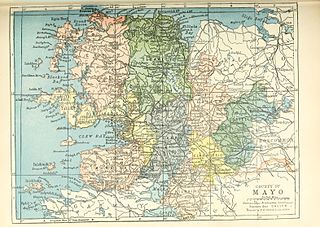Torpaid mac Taicthech (died 913) was an Irish poet.
Torpaid held the post of Chief Ollam of Ireland.
The Genealogies from Rawlinson B 502 state he belonged to the Uí Daigre - “¶1638] Torpaid m. Taicthich m. Échtgusa m. Cáechthuile m. Aimre m. Doaltair m. Fínáin m. Áedloga m. Doborgin m. Finnchon m. Maellrach m. Fáeláin m. Dorbo m. Fáelgine m. Conath m. Luigdech m. Daigri.”
His obit is given in the Annals of Inisfallen as follows- “AI913.2 Repose of Torpaid son of Taicthech, chief poet of Ireland.”
The 910s decade ran from January 1, 910, to December 31, 919.

1769 (MDCCLXIX) was a common year starting on Sunday of the Gregorian calendar and a common year starting on Thursday of the Julian calendar, the 1769th year of the Common Era (CE) and Anno Domini (AD) designations, the 769th year of the 2nd millennium, the 69th year of the 18th century, and the 10th and last year of the 1760s decade. As of the start of 1769, the Gregorian calendar was 11 days ahead of the Julian calendar, which remained in localized use until 1923.

In Celtic cultures, a bard is a professional story teller, verse-maker, music composer, oral historian and genealogist, employed by a patron to commemorate one or more of the patron's ancestors and to praise the patron's own activities.

O'Reilly is a group of families, ultimately all of Irish Gaelic origin, who were historically the kings of East Bréifne in what is today County Cavan. The clan were part of the Connachta's Uí Briúin Bréifne kindred and were closely related to the Ó Ruairc (O'Rourkes) of West Bréifne. O'Reilly is ranked tenth in the top twenty list of most common Irish surnames. It is also the patronymic form of the Irish name Reilly. The name is commonly found throughout Ireland, with the greatest concentration of the surname found in County Cavan followed by Longford, Meath, Westmeath, Fermanagh and Monaghan, and the Province of Leinster.

Irish poetry is poetry written by poets from Ireland. It is mainly written in Irish and English, though some is in Scottish Gaelic and some in Hiberno-Latin. The complex interplay between the two main traditions, and between both of them and other poetries in English and Scottish Gaelic, has produced a body of work that is both rich in variety and difficult to categorise.
Events in the year 1907 in Ireland.
Events from the year 1889 in Ireland.
Flann mac Lonáin was an Irish poet.

The Ó Dálaigh were a learned Irish bardic family who first came to prominence early in the 12th century, when Cú Connacht Ó Dálaigh was described as "The first Ollamh of poetry in all Ireland".
Events from the year 1567 in Ireland.
Gofraidh Fionn Ó Dálaigh, of Duhallow, Country Cork, was an Irish poet and Chief Ollam of Ireland.
The Ollamh Érenn or Chief Ollam of Ireland was a professional title of Gaelic Ireland.
Ceaunfaeladh ua Cuill was an Irish poet who held the post of Chief Ollam of Ireland. He belonged to the family of O’Cuill who were hereditary poets in Munster. Only the Annals of Inisfallen term him Chief Ollam of Ireland. The other annals just describe him as Chief Poet of Munster but it was possible to hold both roles. A poem of his still exists in 160 verses beginning “Teach suain na horchra an aird tiar”, about the death of Eoghan, the grand-nephew of King Brian Boru, who was killed in the battle of Ossory in 1027.
Óengus mac Óengusa, Irish poet, died 930.

Tirawley, archaically known as Tyrawley, is a barony extending southward from the north coast of County Mayo, Ireland. It was created during the shiring of County Mayo out of the Gaelic túath or territory of Tír Amhlaidh, from which it takes its name.
Finshneachta Ua Cuill, Irish poet, died 958.
Events from the year 1591 in Ireland.

Jorhat is one of the important cities and a growing urban centre in the state of Assam in India.